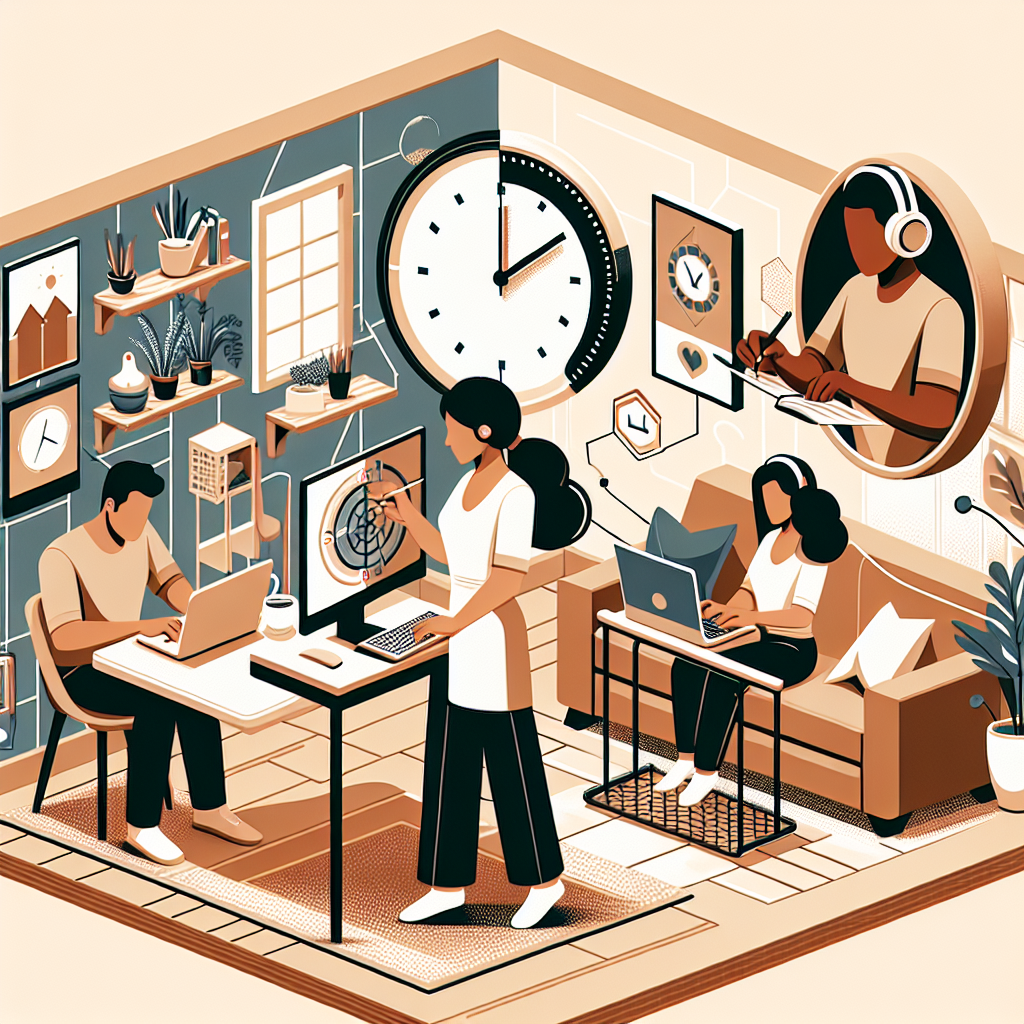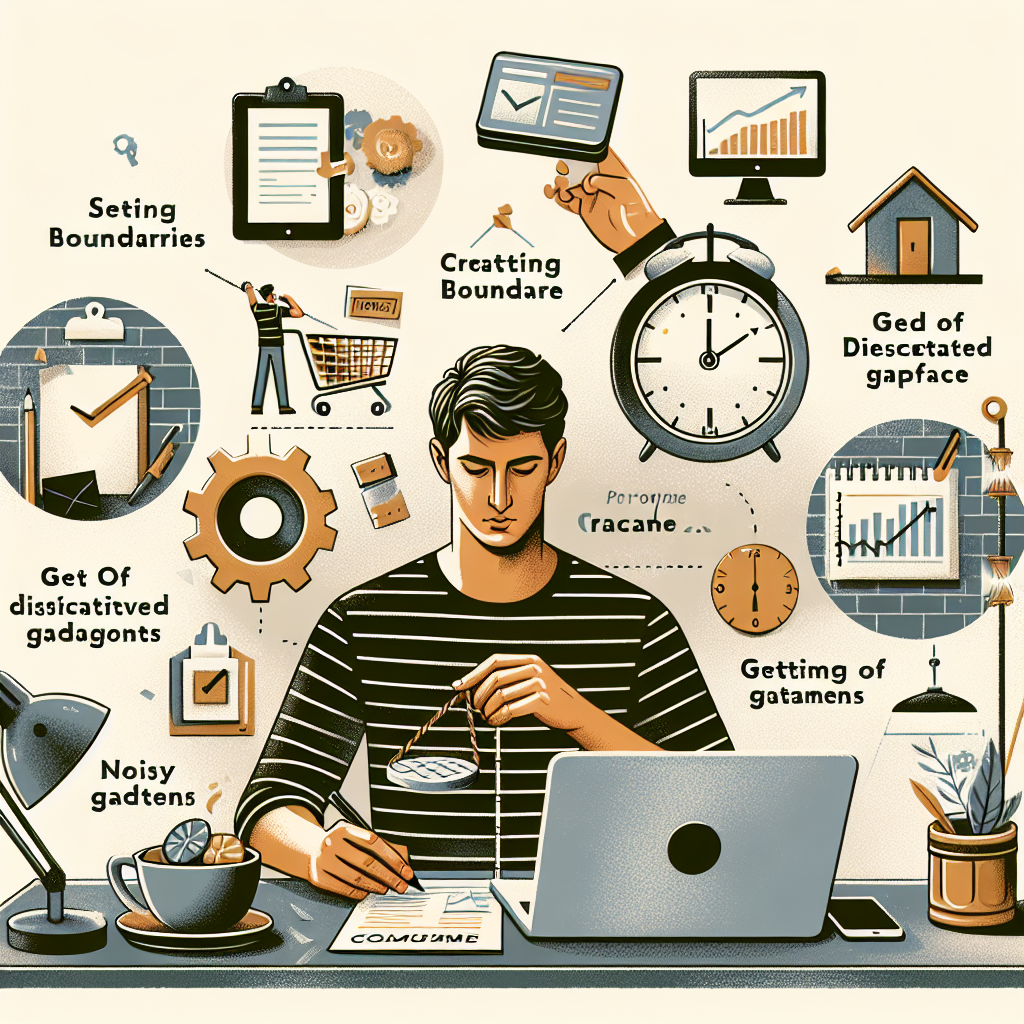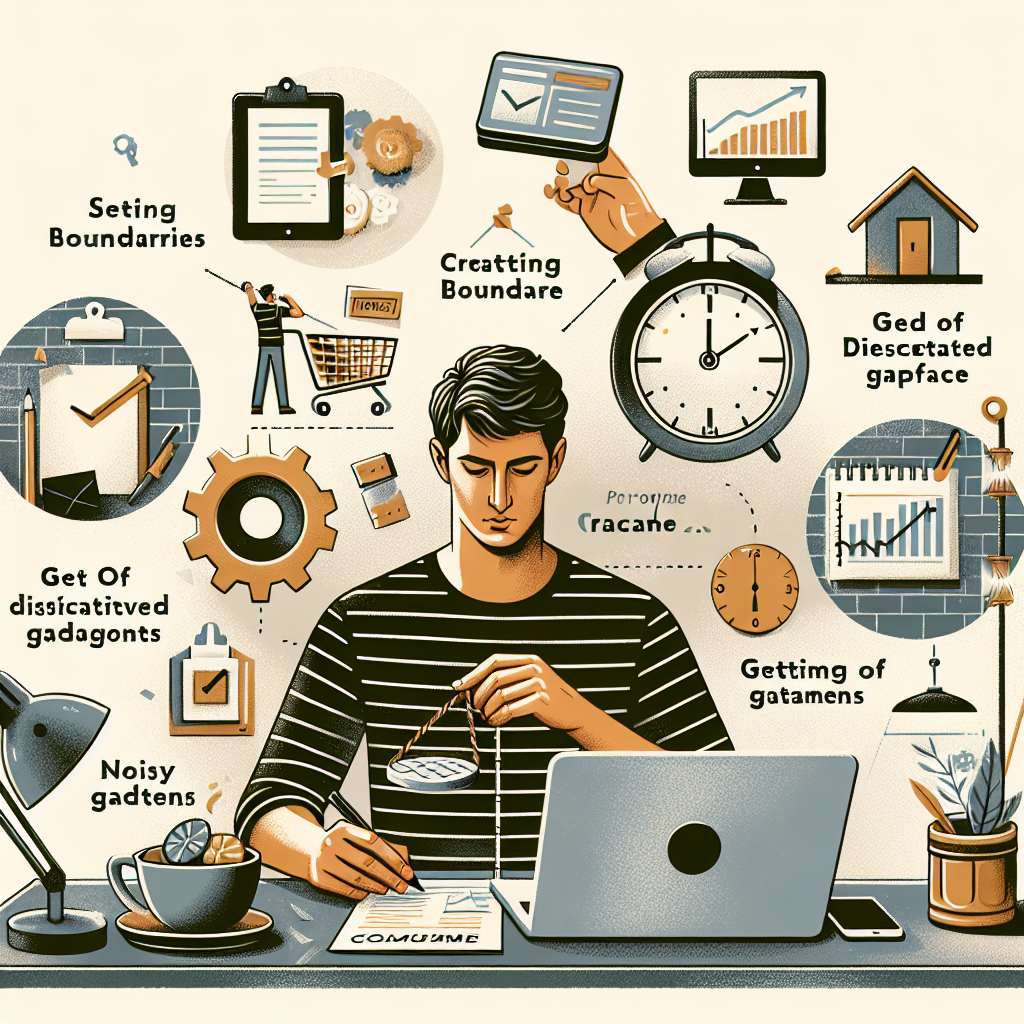In the fast-paced world of remote work, effective time management is crucial for success. As more and more individuals embrace the flexibility of working from home, it is important to find strategies that allow you to stay focused and productive amidst the myriad distractions that can arise. In this article, we will explore some valuable tips and techniques to help you effectively manage your time while working from the comfort of your own home. Whether you are new to remote work or have been doing it for years, these tips will surely enhance your productivity and help you strike the perfect work-life balance. So, let’s dive in and discover the secrets to mastering time management in a work from home job!
Establish a Routine
Working from home can blur the lines between work and personal life, making it essential to establish a routine to maintain a sense of structure and productivity. By setting regular working hours, you create a dedicated time frame for work and maintain a healthy work-life balance. Make sure you communicate these hours with your colleagues or clients to manage expectations and avoid any misunderstandings.
In addition to setting regular working hours, it’s important to create a dedicated workspace. Having a designated area for work helps you mentally transition into a work mode and minimizes distractions. Set up a comfortable and organized workspace that is separate from your personal living areas. This will allow you to focus and be more productive during working hours.
Starting the day with a morning routine can set the tone for the entire day. Whether it’s a morning workout, meditation, or simply enjoying a cup of coffee, find activities that help you kickstart your day on a positive note. This routine can help you feel more energized, focused, and ready to tackle your tasks.
Breaking up the day with planned breaks is crucial for maintaining productivity and preventing burnout. Schedule short breaks throughout the day to recharge and give your mind a rest. Whether it’s a brief walk, stretching, or grabbing a snack, these breaks can help you stay fresh and focused on your work.
Eliminate Distractions
When working from home, distractions can easily disrupt your concentration and workflow. It’s important to implement strategies to eliminate or minimize these distractions.
Turn off notifications on your devices to avoid interruptions from social media, emails, or messaging apps. By limiting these distractions, you can stay focused on your tasks and be more productive.
If you share your living space with family members or roommates, it’s essential to create boundaries. Communicate your work schedule and let them know when you need uninterrupted time to concentrate. Establishing clear communication can help minimize disruptions and create a productive work environment.
Using noise-cancelling headphones can be a game-changer when it comes to minimizing distractions. These headphones block out external noise and create a focused atmosphere, allowing you to concentrate on your work without being disturbed by background sounds.
Utilize productivity apps or website blockers to stay focused and avoid getting sidetracked by time-wasting websites or applications. These tools can help you limit your access to non-work-related content during your designated working hours, increasing your overall productivity.

Prioritize Tasks
To effectively manage your time while working from home, it’s crucial to prioritize tasks based on their importance and urgency. By doing so, you can ensure that you address essential tasks in a timely manner and avoid wasting time on less critical activities.
Creating a to-do list is a great way to organize your tasks and stay on track. List all the tasks that need to be accomplished for the day or week, and prioritize them based on urgency and importance. This way, you can easily identify what needs to be done and focus your efforts accordingly.
Identify high-priority tasks that require immediate attention or have tight deadlines. These tasks should be your main focus, and completing them will give you a sense of accomplishment and progress.
The 80/20 rule, also known as the Pareto Principle, states that roughly 80% of the results come from 20% of the efforts. Apply this principle to identify the 20% of tasks that yield the most significant outcomes. Prioritize these tasks and allocate your time and energy accordingly to maximize productivity.
Delegate tasks whenever possible to lighten your workload and increase efficiency. Identify tasks that can be assigned to others, whether it’s colleagues, freelancers, or virtual assistants. Delegating tasks allows you to focus on high-priority activities and ensures that all tasks are completed in a timely manner.
Break Tasks into Chunks
Breaking down tasks into manageable chunks can make them less overwhelming and easier to tackle. By implementing strategies to divide your work into smaller, more achievable steps, you can increase your productivity and make progress more efficiently.
Time blocking is a technique that involves allocating specific time slots for different tasks or activities. Block out dedicated time periods for each task on your to-do list, allowing you to focus exclusively on that task and complete it within the allocated time frame. This approach helps prevent multitasking and promotes deep concentration on one task at a time.
Complex tasks can be daunting, but breaking them down into smaller steps makes them more approachable. Identify the sub-tasks or milestones within a larger project and create a plan to accomplish them one by one. By tackling each step individually, you can make steady progress and stay motivated.
Alternating between challenging and less demanding tasks can help maintain your focus and prevent mental fatigue. After completing a challenging task, reward yourself by working on a less demanding or enjoyable task. This variety will keep you engaged and energized throughout the day.
Utilize time management strategies such as the Pomodoro Technique to structure your work intervals and breaks. This technique involves working for a set amount of time, typically 25 minutes, then taking a short break before moving on to the next work interval. This structured approach can enhance your focus and productivity.

Manage Email and Communication
Email and communication can easily consume significant portions of your workday if not managed efficiently. Implementing effective strategies for managing email and communication can help you stay organized, minimize distractions, and maintain productivity.
Set specific times to check and respond to emails rather than constantly checking your inbox throughout the day. Dedicate specific time slots, such as the beginning and end of the day, for handling emails. This way, you can allocate focused time for email-related tasks and avoid constant interruptions.
Utilize email filters and folders to stay organized and streamline your email management process. Set up filters to automatically sort incoming emails into appropriate folders based on factors like sender, subject, or priority. This organization system will allow you to quickly find and prioritize important emails, saving you time and avoiding unnecessary clutter in your inbox.
During focused work periods, limit non-essential communication to avoid interruptions and maintain your concentration. Communicate to your colleagues or clients that you have designated work hours dedicated to deep work and that non-essential communication should be kept to a minimum. This will help create a conducive work environment and allow you to stay on track with your tasks.
Establish clear communication expectations with colleagues, clients, or team members. Inform them of your preferred communication channels and response times, ensuring that everyone is on the same page. Setting these expectations helps manage communication effectively and avoids misunderstandings or unnecessary delays.
Avoid Multitasking
Contrary to popular belief, multitasking can actually impair productivity and lead to lower quality work. Focusing on one task at a time allows for deeper concentration, higher efficiency, and better results.
Minimize distractions and interruptions while working on a task to maintain your focus. Close unnecessary tabs or applications on your computer, silence your phone, and create a quiet and dedicated workspace. By eliminating potential distractions, you can better concentrate on your task and complete it more efficiently.
Whenever possible, batch similar tasks together to optimize your workflow. Grouping related activities, such as replying to emails or making phone calls, allows you to streamline your efforts and maintain a consistent focus on similar tasks. This approach prevents unnecessary context switching and improves overall productivity.
Practice mindfulness and concentration techniques to train your ability to stay focused on a single task. Techniques such as deep breathing exercises, meditation, or visualizations can help develop your concentration skills and improve your ability to avoid distractions. By incorporating these practices into your routine, you can enhance your focus and productivity.
Take Regular Breaks
Taking regular breaks throughout the day is essential for maintaining productivity and mental well-being. Breaks allow you to recharge, prevent burnout, and maintain a high level of energy and focus.
Schedule short breaks at regular intervals throughout the day to give your mind a rest. These breaks can be as short as five minutes and should be taken away from your workspace. Use this time to stretch, take a brief walk, or simply relax and clear your mind. Regular breaks prevent mental fatigue and improve overall cognitive function.
Engage in physical activity or stretch during breaks to increase blood flow and energy levels. Whether it’s a quick workout, yoga session, or a simple stretching routine, physical activity can boost your energy and revitalize your body and mind. Even a short burst of exercise can increase alertness and productivity.
Step away from the computer and change your scenery during breaks. Spending extended periods in front of a screen can cause eye strain and reduce productivity. Use your breaks as an opportunity to step outside, soak up some natural light, or simply move to a different area in your home. Changing your environment can provide a mental refresh and help prevent monotony.
Use breaks to relax and recharge, both mentally and emotionally. Engage in activities that you enjoy and find rejuvenating, such as reading a book, listening to music, or pursuing a hobby. Taking time for yourself during breaks allows you to de-stress and return to work with renewed focus and motivation.
Set Realistic Goals
Setting clear and achievable goals is a fundamental aspect of effective time management. By defining your objectives and breaking them down into smaller milestones, you can work towards success in a structured and organized manner.
Define clear and specific objectives that are attainable within a given timeframe. Ambiguous or overly broad goals can hinder progress and make it challenging to measure success. By clearly defining what you want to achieve, you can focus your efforts and establish a roadmap to reach your goals.
Break down long-term goals into smaller milestones or targets. This approach allows you to track your progress and maintain motivation by celebrating smaller victories along the way. By achieving these incremental milestones, you build momentum and gain confidence in your ability to accomplish larger objectives.
Utilize the SMART goals framework to set goals that are specific, measurable, achievable, relevant, and time-bound. This framework provides a structured approach to goal-setting and ensures that your objectives are clear, attainable, and aligned with your overall vision.
Regularly evaluate and adjust your goals as needed. Circumstances and priorities may change over time, requiring you to adapt your objectives accordingly. By regularly assessing your goals, you can make necessary adjustments and stay on track towards success.
Practice Self-Discipline
Working from home requires a high level of self-discipline to stay on task and manage time effectively. By practicing self-discipline, you can overcome procrastination, maintain focus, and achieve your goals.
Hold yourself accountable for managing your time effectively. Set clear expectations for yourself and establish a strong work ethic. Treat your work from home job as you would a traditional office job, maintaining professionalism and adhering to set schedules and deadlines.
Avoid procrastination by breaking tasks into smaller steps and setting self-imposed deadlines. Procrastination often stems from feeling overwhelmed by a large or complex task. By breaking it down and establishing deadlines for each step, you can maintain a sense of progress and minimize the temptation to put things off.
Create self-imposed deadlines for completing tasks or milestones. Setting deadlines for yourself can help you stay focused and instill a sense of urgency. Treat these self-imposed deadlines as seriously as external deadlines and hold yourself accountable.
Reward yourself for meeting goals and milestones. Celebrate your accomplishments, regardless of how small they may seem, to maintain motivation and cultivate a positive work environment. Whether it’s a small treat, a break to engage in an enjoyable activity, or a moment to reflect on your achievements, acknowledge and appreciate your hard work.
Maintain Work-Life Balance
While working from home offers flexibility, it’s important to establish boundaries between work and personal life to avoid burnout and maintain a healthy work-life balance.
Establish clear boundaries between your work and personal life. Separate your workspace from your living space and set specific hours for work. Once the workday is over, close your computer, leave your workspace, and focus on personal activities, hobbies, and relationships.
Schedule personal activities and leisure time to ensure that you have dedicated time for self-care, relaxation, and pursuing interests outside of work. Treat these activities as equally important as work-related tasks, and prioritize them accordingly.
Avoid overworking and burnout by taking regular breaks, setting realistic goals, and practicing self-care. Burnout can negatively impact your productivity, mental health, and overall well-being. Recognize the signs of burnout, such as chronic fatigue, decreased motivation, and increased irritability, and take the necessary steps to prevent it.
Practice self-care and relaxation techniques to nurture your mental and emotional well-being. Engage in activities that promote relaxation, such as meditation, taking a bath, reading a good book, or spending time outdoors. Self-care replenishes your energy levels and allows you to approach your work with a refreshed mindset.
By following these strategies and implementing effective time management techniques, you can thrive in your work from home job. Establishing a routine, eliminating distractions, prioritizing tasks, breaking them into manageable chunks, managing email and communication, avoiding multitasking, taking regular breaks, setting realistic goals, practicing self-discipline, and maintaining a healthy work-life balance will empower you to work efficiently, achieve your objectives, and enjoy a fulfilling work-from-home experience.
